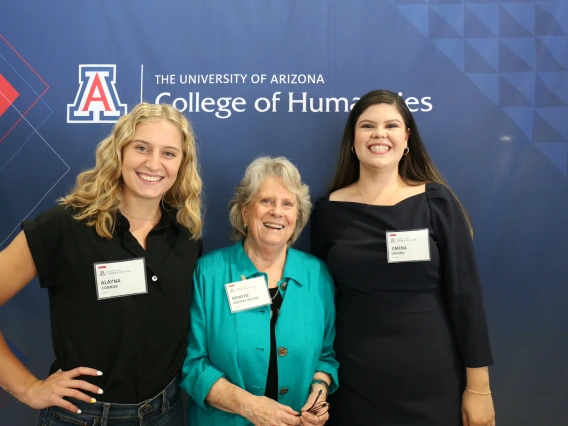
In their lifetimes, Mary Bernard Aguirre and her grandson Pedro Joab Aguirre bridged different countries, cultures, languages and peoples.
Mary, who would become known as Mamie, was an early Arizona pioneer who traveled throughout the territory and northern Mexico. Born in 1844 in St. Louis, she began the journey out West with her family in 1856, where, amidst many challenges and adventures, she eventually settled in Tucson, working as a public schoolteacher and becoming the first Spanish teacher at the University of Arizona. Her grandson Pedro was born in Tucson in 1908, and became a successful business man in the Mexicali Valley, living on both sides of the border.
In 1987, Pedro’s daughter Rowene Aguirre-Medina and other family members endowed a scholarship in honor of both Mamie and Pedro, to be given annually to upper division female students majoring in Spanish. “It was important to my family to keep those names alive, and what better way than an endowed scholarship that’s awarded in perpetuity. It just seemed like the right way to pay tribute to both of them,” she said.
“I see the past, Mamie and my father Pedro, touching the present, these students, who will impact the future,” she said. “When you see the kinds of career paths these young scholars are taking, you know there’s a huge impact. We all have the ability to change the world and with the scholarship, hopefully we’ve given the students the tools they need to really make a difference.”
One important criteria the family included in the scholarship was for the Department of Spanish and Portuguese to consider the eligible scholars’ potential for making a significant contribution to society.
“We wanted the committee to take a bit of a deeper dive and look at folks who they thought would give back to society. That was extremely important to us, that it was not solely an academic scholarship,” she said. “In so many ways, both Mamie and my father gave back to society. They both lived across borders and went back and forth between Mexico and the United States. They were both bridges.”
Aguirre-Medina grew up hearing stories about her great-grandmother, some of which inspired her to come from her home in Mexicali, Baja California, to attend the University of Arizona, graduating in 1963.
“My father was the one who really has kept the stories of Mamie alive,” Aguirre-Medina said. “Some of my earliest memories are the stories of her travels and what it was like to be a pioneer woman in Arizona. That gave me an absolute love of history and in so many ways, she’s walked with me my whole life.”
Each year, Aguirre-Medina gets to meet with the scholars, telling her family’s story and getting to know a bit about the students and their career goals.
“The fact that I’m able to meet them is such a pleasure for me,” she said. “It shows me that what we did in setting this up is exactly what we’d hoped for. What better way can we honor Mamie and my father than sending these wonderful, bright young students out into the world to make a difference?”
Aguirre-Medina likes to pass on a copy of the book Journey of the Heart, the story of Mamie’s life, written by Canadian author Annette Cray.
“It’s a story of challenges and adventure and of change. In reading her story, I hope that the students will find there were two main qualities about her, that I hope are in my DNA, which are courage and curiosity,” she said. “Even though she had tragedies in her life, losing her husband very young, she has the courage to go on with life and make a difference. And she was always fascinated and curious about the world around her.”
Many of the Aguirre scholars have been double majors who’ve gone on to work in medical or legal fields, using their language skills to help underserved communities.
“Especially in the last 10 to 15 years, a lot of these scholars are heritage speakers and it’s been really exciting to see this transition. So many of the students say ‘I will give back when I can and I will help others,’” She said. “Personally, I think about the heritage speakers because our family for generations has been cross-border. The two languages have been a part of us and so having these heritage speakers has been an absolute thrill.”

